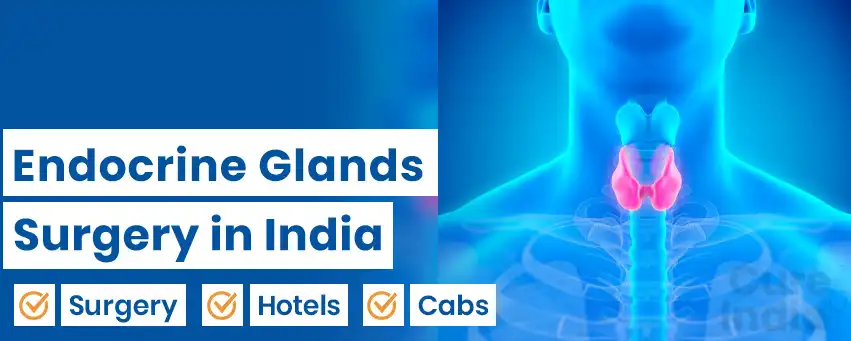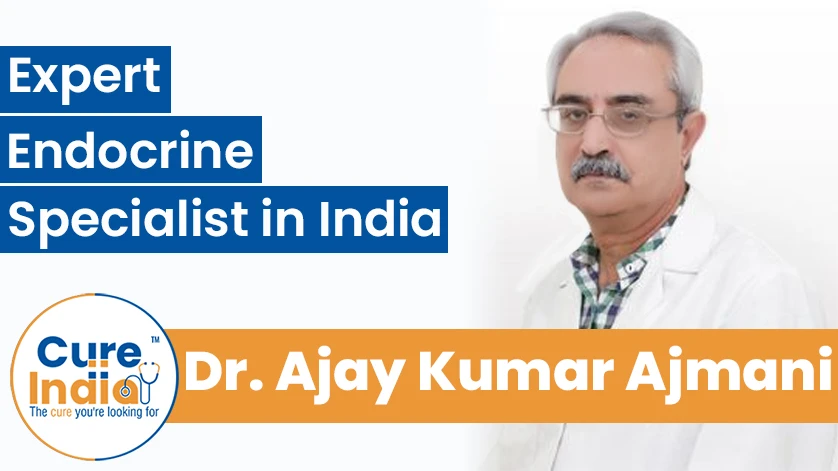

Endocrine glands are the organ's portion that produces and secrete hormones directly into the blood for a specific role. Hormones act as messengers in the human body and perform various functions regarding growth, development, metabolism, and fertility.
Generally, the endocrine gland produces a particular hormone and sends that via blood to another organ to perform a function. So, hormones, producing glands, and target organs all create an endocrine system that helps in the regulation of different functions.
Many endocrine glands are present in the body and perform different roles. For example, the pituitary gland is the most important endocrine gland, which produces hormones to regulate the operational functions of all other hormones.
If any gland produces excessive or less hormone due to disease, the body's working functions are disrupted. At that time, you will need proper medication for treatment. India is one of the best countries for African patients for getting endocrine gland surgery with the country's high-quality and cost-effective procedure. This page will be a patient's guide to learning about endocrine gland surgery in India.
In the human body, many types of glands are present that secrete various substances into the blood for various work. Endocrine glands refer to those glands that produce hormones and release them directly into blood without any duct.
An endocrine-producing gland doesn't need only to produce hormones and nothing else. For instance, the pancreas produces hormones like insulin and glucagon and digestive enzymes. Although for different substances, there are separate cells present in the pancreas.
As the endocrine system consists of many glands and different hormones, you can see a variety of symptoms for each disorder. As hormones work as messengers, you can see mood swings and problems in almost every disease. Here is a list of symptoms according to some common diseases:
Symptoms of Diabetes Mellitus:
Symptoms of Acromegaly:
Symptoms of Addison's disease:
Apart from the disease mentioned above, there are also Cushing's syndrome, hypo and hyperthyroidism, and many more diseases related to endocrine glands.
Many organs produce hormones in the human body, but not all are considered endocrine glands. Some organs have endocrine glands that produce the major hormones and endocrine functions. Here is the list of all types of endocrine glands of the body:
1. Hypothalamus:
Hypothalamus is present in the brain and performs endocrine functions by sending hormonal messages to the pituitary gland.
2. Pituitary gland:
Present in the brain and is the master's gland of the endocrine system. It produce different hormones to control other hormones. For example, the gland secretes TSH to control thyroid hormones. Produce ACTH to look over the action of adrenal cortex hormones. Similarly, secrete a luteinizing hormone to control estrogen in females and testosterone in males. Not only that, but the gland also secretes hormones to control certain functions like prolactin which helps form breast milk, and ADH to control kidney function.
3. Pineal gland:
Pineal gland is present in the brain and helps form melatonin that helps you sleep.
4. Thyroid gland:
Present in front of your neck. The gland has two lobes on either side of your windpipe and produces hormones that regulate metabolism and growth. Thyroid hormone levels are crucial in maintaining the body's metabolism as excessive and low amounts can cause several diseases. Excessive amounts cause hypertension, weight loss, and high blood pressure, while low amounts cause fatigue, low blood pressure, depression, and so on. The endocrine gland also creates calcitonin which helps in bone density increase.
5. Parathyroid gland:
Presents opposite to the thyroid gland in the neck and secretes parathyroid hormones that play a vital role in maintaining bone health.
6. Thymus:
The gland between two lungs and produces white blood cells during the early stage of development. After puberty, the endocrine starts to decrease in size.
7. Adrenals:
The small endocrine glands present on top of both your kidneys and prepare your body in critical situations. They produce adrenaline and corticosteroid hormones. Adrenaline is an emergency hormone because it works when you face environmental danger. The hormone makes your body respond in that situation through either fight or flight mode. Adrenalin affects your metabolism, blood flow, heart rate, sexual function, oxygen intake, and many others.
8. Pancreas:
The organ makes enzymes for digesting food and hormones to control blood sugar levels. The pancreas secretes insulin and glucagon hormone in the blood. Besides, the endocrine cells of the organ also produce somatostatin which regulates the former two hormones. When the organ fails to produce insulin, people have diabetes.
9. Ovaries:
Women's ovaries produce estrogen and progesterone hormones. Both hormones play vital roles in the development of women's bodies during puberty, help in the growth of breasts, controls the menstrual cycle, and helps in pregnancy.
10. Testes:
In men, testes produce testosterone hormone, which helps grow facial and body hair during puberty. The hormone also helps in penis enlargement and producing sperm.
Endocrine disease disturbs the endocrine system and can create many health issues. As many hormonal glands are present in the human body, you can observe a variety of disorders related to specific endocrine glands. Anyone can see some common diseases mentioned below:
In the disease, your body will have an excess amount of blood glucose as your body is either unable to make insulin or can not use the insulin to regulate glucose. You can see people suffering from either Diabetes 1 or Diabetes 2.
■ Symptoms: You will experience too much thirst and hunger, frequent urination, rapid weight changes, tiredness, blurry vision, and so on.
■ Treatment: Depending upon your type of diabetes doctor prescribes medicines and lifestyle changes.
When adrenal glands produce high amounts of cortisol, you face Cushing's syndrome. Normally cortisol helps in stressful situations and controls the body's vitals, like blood pressure, at that moment.
■ Symptoms: Thin arms and legs, presence of purple stretch marks, muscle weakness, excessive hair growth, rounded face, and many others.
■ Treatment: In case of the disease, doctors mostly prefer surgery to remove the excessive part of the adrenal gland that causes the problem.
The condition occurs when the body secretes excessive growth hormone.
■ Symptoms: Your hands and feet will become swollen, presence of protruding jaw, facial features will grow abnormally, and so on.
■ Treatment: Doctors can prescribe medication, surgery, or even use radiation therapy to suppress excessive hormone production.
Besides the disease mentioned above, there are also endocrine diseases related to the ovaries and thyroid glands.
In medical science, doctors who diagnose and treat various diseases related to the endocrine system are known as endocrinologists. They check all symptoms, provide sufficient tests to diagnose the condition, and give the proper medication. Endocrinologists treat diabetes, acromegaly, Hashimoto's thyroiditis, and other hormones and endocrine glands syndromes.
They not only provide medicines but sometimes can conduct necessary surgery also. When you consult an endocrinologist, you get a clearer idea about your hormonal problems and a better way to deal with them.
When it comes to treating disorders of the endocrine glands, choosing the right specialist can help decide outcomes. India is home to some of the most experienced and highly qualified endocrinologists, who are regarded for their expertise, advanced treatment techniques, and patient-centric treatments. Let's listen to some of our best doctors for endocrine gland treatment in India:
Dr. Vivek Aggarwal is a top endocrinologist in India who is known for his strong expertise and experience of over 15 years in hormonal disorders, diabetes management, thyroid diseases, and metabolic health. He is recognised worldwide for his accurate diagnosis, evidence-based treatments, and high success rates for endocrine gland surgery.

Dr. Ambrish Mithal is one of India’s most distinguished specialists in endocrine gland disorders in India, with a reputation for managing thyroid diseases, diabetes, parathyroid disorders, metabolic bone diseases, and hormonal imbalance conditions with high success rates.

Dr. Ajay Kumar Ajmani is an expert endocrine specialist in India who is well known for his proficiency in treating pituitary disorders, adrenal gland issues, diabetes complications, and thyroid dysfunctions. His extensive expertise and success rates have made him a preferred doctor for the management of a wide range of endocrine problems.

Dr. Niti Agarwal is an experienced endocrinologist in India specialising in treating endocrine disorders, thyroid disorders, diabetic disorders, polycystic ovary syndrome, obesity-related hormonal issues, and more. She is appreciated for her comprehensive and personalised treatment strategies that are tailored to each patient’s needs.

Many people from African countries like Nigeria, Ethiopia and Rwanda travel to India seeking the best treatment at minimum cost. Indian endocrine surgery hospitals are well-equipped with the best and latest treatment options and modern technology. The surgeons in India are well trained and are constantly enhancing the treatment protocols to provide the best treatment. For endocrine treatment, Indian hospitals provide Laparoscopic surgery, Robotic Surgery, Open Surgery, etc. International patients choose the country because of the low cost of endocrine surgery in India. The cost of Endocrine Surgery in India is mentioned below.
| Treatment | Cost in India | Stay in India |
|---|---|---|
| Endocrine Surgery in India | $2,000 | 7 Days |
Endocrine cancer is a condition where cancer cells are present in a particular endocrine gland and causes several problems in the body. However, without the proper diagnosis, you can not assure the presence of cancerous cells in the gland. Although you can notice some common symptoms including :
Humans are born with endocrine systems that play vital roles in the body regarding growth, development, and metabolism. When a child is suffering from any hormonal problem, you need to consult with a pediatric endocrinologist. They are specially trained in pediatric endocrinology to deal with hormonal disorders of children.
The most common endocrine diseases in children are diabetes type 1, growth hormone-related problems, and many more. They provide treatment for infants to young adults.
Endocrine therapy is also called hormone therapy, where doctors use synthetic hormones to treat a disease. In therapy, they mostly use artificial hormones to block or add a working force for a natural hormone already in the body.
In cancer treatment, doctors use certain hormones to reduce the cancerous cells and stop their working process.
Endocrine glands are important components of the body that produce different hormones to control metabolic functions of the body. Problems in any gland can create severe malfunctions in your body. Although with proper diagnosis and treatment, anyone can live a healthy life after any hormonal disease. In brief, you can have plenty of options for treating most hormonal diseases at present.
